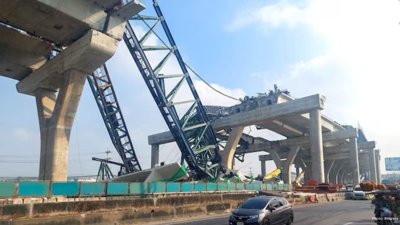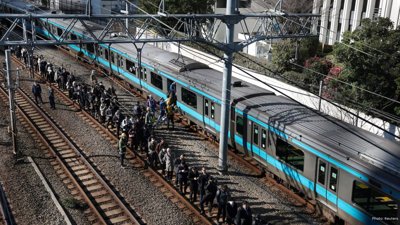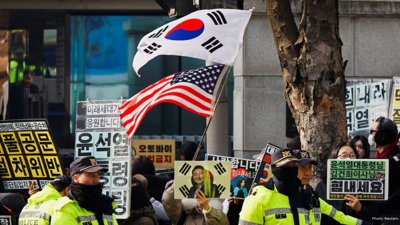
Post by : Meena Rani
More than 300 South Korean workers who were detained in a large immigration raid at a Hyundai battery plant construction site in Georgia, United States, are finally returning home. The incident has drawn international attention, highlighting the challenges faced by foreign workers in the U.S. and the diplomatic tensions that can arise from immigration enforcement.
The Raid at Hyundai’s Georgia Battery Plant
The events unfolded early in September 2025, when U.S. immigration authorities carried out a large-scale operation at the Hyundai Motor Group’s battery plant construction site in Ellabell, Georgia. This site, part of Hyundai’s ambitious plan to expand electric vehicle production in the United States, was also working closely with LG Energy Solution, which is responsible for battery production at the facility.
Authorities described the operation as one of the largest single-site immigration enforcement actions in the history of the U.S. Department of Homeland Security. During the raid, around 475 individuals were detained for allegedly working without proper visas. Among those detained were 316 South Koreans, 10 Chinese nationals, three Japanese nationals, and one Indonesian worker. The majority of these workers were employed directly or indirectly through LG Energy Solution, which was contracted for work at the battery plant.
Workers reported that immigration officials arrived in buses and began rounding up employees from the construction site. Many of the detained workers were handcuffed and taken to detention facilities for questioning. This aggressive action shocked both the workers and the wider public because it interrupted ongoing construction at a major industrial project and brought unwanted media attention to the labor practices at the site.
Diplomatic Concerns and Reactions
The raid quickly became a matter of diplomatic concern. South Korean President Lee Jae Myung publicly expressed his disappointment with the U.S. approach, stating that the incident could harm the confidence of Korean companies in investing in the United States. President Lee emphasized that the detained workers were following company instructions and that such harsh treatment could discourage future investments.
South Korea’s Ministry of Foreign Affairs also engaged with U.S. authorities to ensure the safe and fair treatment of the workers. Officials discussed whether the detainees would be classified as deportees or voluntary departures, a distinction that affects their ability to return to the U.S. for work in the future. The diplomatic negotiations proved crucial in preventing further escalation and helped ensure that most workers could return home safely.
President Donald Trump, in a rare intervention, directed U.S. authorities to release the workers and allow them to return to South Korea without facing harsh legal penalties. Under this directive, the detained South Korean workers were given the option to return home or remain in the United States if they wished. Nearly all of the workers chose to go back home, citing exhaustion and the desire to reunite with their families. Only one South Korean worker decided to stay in the U.S., due to personal family reasons.
The Journey Home and Worker Experiences
After several days of detention, the workers were released and boarded flights from Atlanta to South Korea. They returned home without handcuffs or further legal complications. Many of the workers shared that the detention was a stressful and frightening experience. They described long waits in detention centers, limited communication with family members, and anxiety about potential deportation.
Despite the challenges, South Korean authorities praised the workers for their patience and professionalism. Officials noted that this incident highlighted the importance of proper visa management and compliance with local labor laws to prevent similar situations in the future. The workers’ return was also seen as a relief for Hyundai and LG Energy Solution, allowing construction and production schedules at the Georgia facility to resume more smoothly.
Impact on U.S.-South Korea Business Relations
The raid raised broader questions about foreign investment in the United States. Companies like Hyundai and LG Energy Solution are major employers and significant contributors to the U.S. economy, yet strict visa enforcement can create uncertainty and disrupt large-scale projects. The incident has sparked discussions about balancing immigration law enforcement with the need to attract and retain skilled foreign workers.
South Korean business leaders have warned that repeated incidents of this kind could lead companies to reconsider U.S. investment plans or shift projects to other countries with more predictable immigration policies. At the same time, U.S. authorities have emphasized that compliance with visa regulations is critical for all companies operating in the country. Both sides have expressed a willingness to improve communication and clarify visa requirements to prevent similar incidents in the future.
Legal and Policy Implications
The Georgia raid also brought attention to the complexities of U.S. labor and immigration law. Workers on temporary work visas or other non-immigrant visas must adhere to strict conditions, and employers are required to ensure that all employees have valid documentation. The scale of the Hyundai plant operation, combined with the number of foreign workers, made it a challenging environment to monitor.
This case may serve as a precedent for how large industrial projects involving foreign labor are managed in the United States. Legal experts suggest that companies must implement rigorous compliance programs and maintain close contact with immigration authorities to avoid enforcement actions that can disrupt operations and damage reputations.
Human Angle: The Workers’ Perspective
Beyond legal and diplomatic issues, the incident sheds light on the human side of global labor mobility. Many of the detained workers were young professionals seeking better job opportunities abroad. They traveled to the United States expecting stable employment and professional growth, only to face an unexpected detention. The experience has been described as emotionally taxing, with workers feeling fear, confusion, and helplessness.
Family members in South Korea were also deeply concerned during the detention period. Many spent days trying to contact their loved ones, uncertain of their status or safety. The eventual release and return home were celebrated as a relief and a victory for diplomacy and worker advocacy.
Moving forward, both Hyundai and LG Energy Solution are expected to review their employment and visa practices carefully. The incident may encourage companies to provide additional training for foreign workers on visa requirements and legal obligations while working in the U.S. It also highlights the need for governments to cooperate on labor mobility and ensure that workers are treated fairly.
Diplomats and business leaders from both countries are now focused on preventing similar incidents in the future. Talks have begun about creating clearer guidelines for multinational companies and their foreign employees. These discussions aim to ensure that major industrial projects can continue smoothly while respecting the legal frameworks of host countries.
The release and return of over 300 South Korean workers from Georgia mark the resolution of a tense and widely publicized situation. While the raid highlighted gaps in immigration compliance and raised questions about foreign investment in the United States, it also demonstrated the importance of diplomacy and international cooperation.
For the workers, the experience has been a lesson in patience and resilience. For Hyundai, LG Energy Solution, and other multinational companies, it serves as a reminder of the importance of proper planning, legal compliance, and attention to the human dimension of global business. For governments, it underscores the need to balance strict law enforcement with policies that support foreign investment and protect workers’ rights.
As global business operations continue to expand, incidents like the Georgia raid will remain a reference point for companies, policymakers, and workers navigating the complex intersection of labor, law, and international relations.
Hyundai, South Korea, Georgia, U.S., LG Energy Solution, battery plant










Advances in Aerospace Technology and Commercial Aviation Recovery
Insights into breakthrough aerospace technologies and commercial aviation’s recovery amid 2025 chall

Defense Modernization and Strategic Spending Trends
Explore key trends in global defense modernization and strategic military spending shaping 2025 secu

Tens of Thousands Protest in Serbia on Anniversary of Deadly Roof Collapse
Tens of thousands in Novi Sad mark a year since a deadly station roof collapse that killed 16, prote

Canada PM Carney Apologizes to Trump Over Controversial Reagan Anti-Tariff Ad
Canadian PM Mark Carney apologized to President Trump over an Ontario anti-tariff ad quoting Reagan,

The ad that stirred a hornets nest, and made Canadian PM Carney say sorry to Trump
Canadian PM Mark Carney apologizes to US President Trump after a tariff-related ad causes diplomatic

Bengaluru-Mumbai Superfast Train Approved After 30-Year Wait
Railways approves new superfast train connecting Bengaluru and Mumbai, ending a 30-year demand, easi